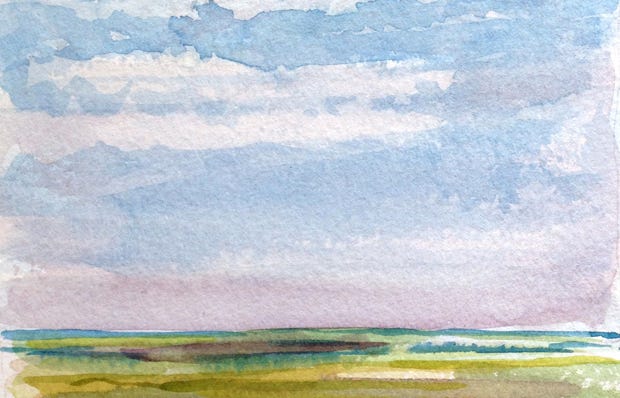Lord, make me an instrument of thy peace.
I made several attempts to capture my response to this first line of St. Francis’ prayer. Here’s one: It’s a sign of spiritual maturity to dedicate myself to be of service in the world. There is a nice reciprocity in knowing that the world is not only for me; I am also for the world.
But that sounds like I’m claiming spiritual maturity, which could not be farther from the truth.
What I love about1 this line is its humility. What’s more humble than the willingness, even the longing, to turn over my life to—well, to what exactly? That word, “Lord,” trips me up, steeped as I’ve been in Western Christian tradition, with its centuries of patriarchal hierarchies and oppression.
I tried dropping the word altogether: Make me an instrument of peace. But that feels truncated, trivial, and trite. When the higher power is stripped out, it loses the appeal to the unseen, the majestic, the otherworldly. In short, to the sacred. That’s it, isn’t it? Those eight words are an invocation, a summoning of great power. A linguistic bowing down.
Where I went wrong is to see Lord as something, or someone, outside of myself. If instead I see it as pointing to my own best Self, to what is lordly within me, it opens up an inner conversation. When I play with substituting other words for it, such as Great Mother or Spirit or Source or Divine Creator, interesting possibilities arise.
I had an experience once while meditating, an absolute certainty that I was touching a (or touched by) divine energy. Jazzed with its pulsing, I knew with absolute clarity that my hands are God’s hands, my body is God’s body, my eyes are God’s eyes. I am the Universe seeing itself, a divine spark, spirit embodied. Rilke has a wonderful poem about this. He imagines God accompanying us as we are made, then leaving us with a bit of advice on how to live well.
You, sent out beyond your recall,
go to the limits of your longing.
Embody me.Flare up like a flame
and make big shadows I can move in.Let everything happen to you, beauty and terror.2
To pray to be made an instrument of peace is to acknowledge the choice, and to admit that I need help daily, even moment to moment, in making that choice. There is a wise saying: 3
There is no way to peace. Peace is the way.
A good reminder to embody peace—not to protest angrily in the streets for it, nor to hate others who are not peaceful. It’s not even a matter of will, as Francis reminds us here. It’s an act of turning over my will, an act of allowing and trusting. I am in God’s hands and I am God’s hands, both.
To be an instrument of peace asks me to tune and practice, just as with a musical instrument. How can I cultivate peace today? I can take a breath instead of reacting mindlessly and playing out old patterns and habits. I can take a moment to sit in stillness and experience the feeling of peace washing over me, rising from within a silent place deep inside. Reciting St. Francis’ prayer is a good way to do that.
A reader reminded me that Sarah McLachlan recorded it as a song! ❤️
Read the introduction to this series here:
Saturday brings reflections on the next verse: Where there is hatred, let me sow love.
If you enjoyed this post, a lovely ❤️ keeps me going. Another way to show love is to share this post with others by restacking it on Notes, via the Substack app. Thanks!
and feel intimidated by
Rainer Maria Rilke; translation by Joanna Macy and Anita Barrows, full poem is here
This is attributed to “American Gandhi,” A.J. Muste, but was also credited to Gandhi himself on the plaque on his bust at the U.N.







Thank you so much for this series, Julie. It's just the thing. I also get tripped up over the word Lord, given how our understanding of the term is wrapped up in European medieval feudalism, patriarchy, and colonialism. It helped when I considered that when we see LORD in the Hebrew Bible, it's standing in for another word--the Hebrew name for God, which we're not supposed to say aloud. Lord is a stand-in word. My Hebrew Bible professor friend tells me that the Hebrew word for G-d is the non-gendered active causative verb for to-be. Essentially, it translates to "the one who causes things to be and keeps them be-ing." So, whenever I see Lord, I now replace it in my mind with "One who causes things to be and sustains them." Or, easier, I replace the term with the one my Indigenous friends and colleagues prefer: Creator. It gets at that sense of creating and sustaining, and I think better represents the spirit of the original Hebrew than Lord.
I found myself meditating on the terms instrument and channel this morning. The idea of being a thing through which the spirit/breath moves. In a time of such great anxiety, there's a wonderful invitation to simply be open and rest in that piece. It's not about doing anything or solving anything--and invitation to sit and rest. I love that.
“Peace is the way.” 🙏 Thank you for this reminder, and the active choice within it. I think peace can be confused with passivity but when we frame it as a choice, it becomes a deliberate and powerful and radical act of benevolence.